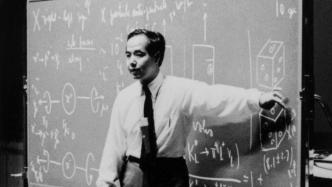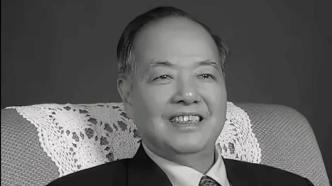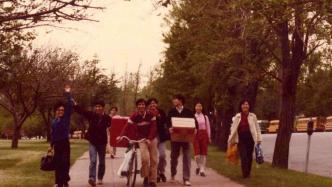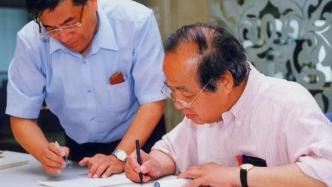
For several days, Liu Huaizu's phone calls almost never stopped from daytime, and many media called to inquire about Tsung-Dao Lee's life and deeds. Some people asked him not to accept too many interviews for the sake of his health, but he still insisted on talking. He said he hoped to tell everyone about the real and vivid Tsung-Dao Lee beyond the halo.
Liu Huaizu, 84, was responsible for assisting Lee in coordinating the construction of the Beijing Electron-Positron Collider, the admissions of the China-U.S. Joint Graduate Entrance Examination Program in Physics (CUSPEA), the operation of the China Center for Advanced Science and Technology and other domestic affairs. He also helped to organize Mr. Lee's tomb in his hometown of Suzhou, including five reliefs of "Science and Art", which are very beautiful and shocking.
In the early morning of August 4, local time, Nobel Prize winner in Physics Tsung-Dao Lee passed away at his home in San Francisco, USA, at the age of 98. After hearing the news, the past emerged in Liu Huaizu's mind, and he recalled many details of his time with Mr. Lee. He remembered that at first, because they both spoke Shanghainese, they were closer; he also remembered that every time Mr. Lee came to Beijing, after attending a banquet, he would excitedly pull him to chat about everything, and would not leave until the early hours of the morning; he also remembered Mr. Lee's spirit of truth-seeking and perseverance in scientific research.
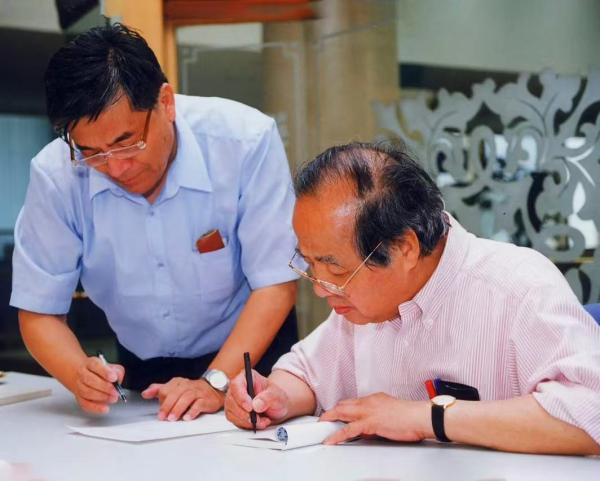
Photo courtesy of Liu Huaizu and Li Zhengdao
In order to commemorate Mr. Tsung-Dao Lee, on August 7, Liu Huaizu told The Paper (www.thepaper.cn) about his memories of Mr. Lee. The following is his oral account:
Shanghainese brings us closer
Many people have called me these days. This morning, an old leader called me and said that I was "the first person in China who knew Mr. Tsung-Dao Lee." I certainly cannot accept the title of "first person." I was just a staff member who worked for him and handled his domestic business. My main job before was deputy director of the General Office of the Chinese Academy of Sciences and worked on the Beijing Electron-Positron Collider.
I started to get in touch with Mr. Li in 1978, when I was in charge of the General Affairs Office of the State Science and Technology Commission (now reorganized and renamed the Ministry of Science and Technology of China). At that time, Mr. Li was promoting the project of training high-energy experimental physicists in China, so he needed a professional staff member to assist him in handling domestic affairs. Mr. Li would often come to me to learn how to deal with specific situations, and gradually we became familiar with each other.
During the communication, we found that we had a lot in common. For example, he was born in Shanghai and speaks Shanghainese very well. Sometimes I can also communicate in Shanghainese. After a while, we became closer. Later, he half-jokingly and half-seriously said, "You can be my assistant."
Around 1984, his work of communicating and handling business in China became part of my job. It can be said that his affairs in China were my affairs.
Mr. Li would stay in China for more than half a month each time, and I had to accompany him the whole time. I was very nervous, and sometimes I had to wait for him to fall asleep to handle some paperwork. He was very energetic, and sometimes after attending a dinner party outside, he would pull me to chat about all sorts of things. He liked to drink red wine, and sometimes he would drink until after 1 a.m.
Mr. Li is a very low-key and modest person. In 1989, Mr. Li proposed to establish the China Postdoctoral Science Foundation. Some people suggested that he should be named after it, but he firmly disagreed to use his own name. In May 1990, the China Postdoctoral Science Foundation was officially established. From then until today, he has been the honorary chairman of the China Postdoctoral Science Foundation.
Mr. Li came to Beijing many times and loved the dishes cooked by a top chef in a restaurant in Beijing at that time. Mr. Li was very polite and would take the initiative to toast the top chef after every meal. Later, when the two became familiar with each other, when the chef visited the United States, Mr. Li invited his chef friend to his home and cooked Li's Western food for him.
He is not a "conventional" person
He spent a lot of effort to arrange one-on-one laboratories for CUSPEA graduate students in the United States, which was established in 1979. He went to the director, professor, and researcher of the laboratory to negotiate that American professors would train these graduate students.
At that time, we had no channels to send students to North America, nor did we have GRE and TOEFL exams, so it was impossible to follow the normal procedures. Mr. Li was not a "conventional" person. During his lectures in Beijing, he contacted the professors of the Department of Physics at Columbia University and asked them to send a test paper that could be used to enter the graduate school of the Department of Physics at Columbia University to Beijing. This test selected five students, including Tao Rongjia and Chen Chengjun. Li Zhengdao sent their test papers and resumes to Columbia University and asked the Department of Physics to hold a meeting to study whether they were qualified to enroll for further studies. These five students were successfully enrolled due to their excellent grades.
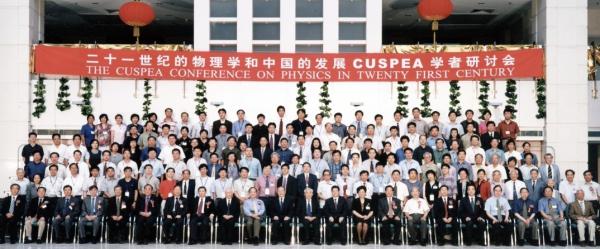
CUSPEA Scholars Seminar on Physics in the Twenty-First Century and the Development of China.
At the same time, Mr. Li suggested that the school should hire them as research assistants and teaching assistants to cover their tuition and living expenses in the United States. At that time, the tuition and living expenses of graduate students in American universities for one year were equivalent to more than 100,000 yuan. At that time, the national finances were very difficult and it was difficult to come up with such a large sum of money at once. This was hard for Chinese students to imagine.
Mr. Li wrote down his ideas in detail and sent them to the heads of physics departments of more than 40 first-class universities in the United States, asking them to fill out a form to participate in the project if they are willing to recruit Chinese students, and asked them to explain what research projects their respective research institutes have expertise in. The letter put forward specific requirements and conditions for participating in the plan, including that all accepted Chinese students are formal graduate students of the school, and that living expenses, tuition fees, and medical expenses are all borne by the school until the Chinese students obtain a doctorate degree.
In his letters to various universities, Mr. Li promised that he would send high-level Chinese students, and named this new admission method and organization the Sino-US Joint Admissions Program for Physics Graduate Students in the United States. From December 26 to 29, 1979, seven schools including Columbia University, Virginia Polytechnic Institute and Oregon University admitted a total of 13 Chinese graduate students.
A very diligent and thoughtful scholar
Mr. Li's care for the young researchers of that generation is obvious to all. He is also a very enthusiastic and passionate person. "Creating opportunities for young people" is also his consistent wish. He has expressed this wish to me many times, including when discussing postdoctoral fellows, government funding and other matters. He emphasized this point.
When Mr. Li was 80 years old, he returned to his hometown Suzhou and held a "scholarly dialogue" with students at the invitation of Suzhou University. A female student at the time asked Mr. Li what his approach to scholarship was.
Mr. Li said that learning, learning, you must learn to "ask"; only learning to answer, not learning to "ask", is not "learning". To do research, you must first learn to "ask", be able to ask questions, and then think about the questions yourself and find the answers yourself. This is a kind of creative thinking, which can truly master and increase knowledge. Although he is already eighty years old, he has always been at the forefront of physical science research. In 2006, he wrote five important physical science papers, including new progress in the study of quark plasma and the solution to the famous world problem "Schrödinger equation". In addition to being a genius, he is also a very diligent and thoughtful outstanding scholar.
Many media have asked me what I want to say to the young researchers now. I feel that the researchers at that time were very simple and honest, and could put their minds to research. Some young people nowadays are more distracted, including researchers, who are not down-to-earth and unwilling to be lonely. Research requires perseverance and indifference to fame and fortune. Our salaries were not high at that time.
I resigned from Mr. Li after I was hospitalized for cerebral thrombosis in November 2006, and officially left in mid-2007. I didn't know much about his life after that. He didn't approve my resignation and dragged his feet for a while. Later, our contact gradually became less. Despite this, we still kept in touch in the form of greeting cards.
I helped to arrange Mr. Li's tomb in his hometown of Suzhou, including five reliefs of "Science and Art", which are very beautiful and shocking. After the burial ceremony in November this year, the words on the tombstone will be painted black and white to express condolences, and I will go to see him off at that time.
